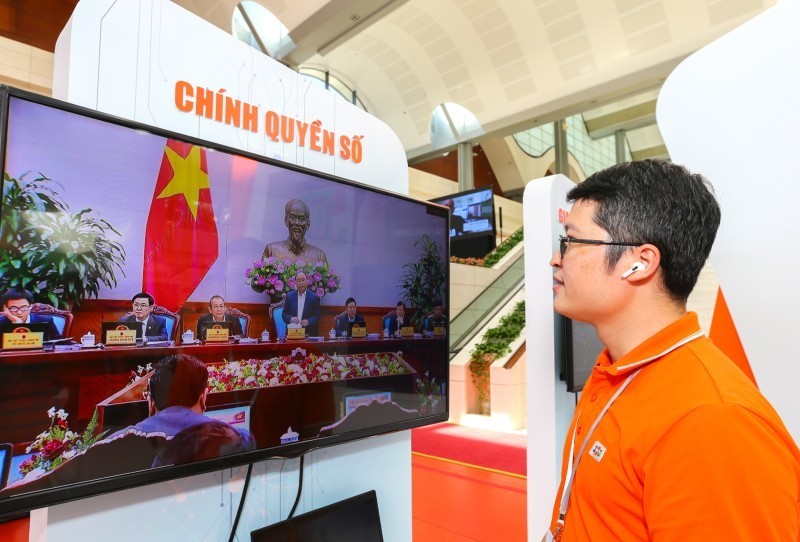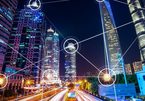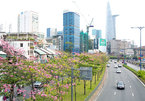People are the center
Countries are becoming digital economies and societies with the support of digital technology which improves management efficiency, develops businesses, and enhances people’s lives.

Deputy Minister of Science and Technology Bui The Duy said in 2020, when all countries are facing great challenges from the Covid-19 pandemic, the Ministry of Information and Communications (MIC), together with telcos, have gained certain achievements in fighting the epidemic and helping people have normal lives both during the social distancing time and the ‘new normal’ period.
Vietnam has been making every effort for many years and facing difficulties to deploy digital technology, and organize online teaching and meetings.
However, just two months after the pandemic broke out, all students in Vietnam could access online learning. This shows the strong development of telecom services and the application of digital transformation in the country.
Duy said that digital technology is developing rapidly in cities, but also in rural areas.
“Despite a lot of difficulties, we have 4G throughout the country and can see images of students in remote areas studying online without interruption,” Duy said.
Urban digital transformation and smart cities are similar phenomena that take place at the local level.
Quang Ninh province, which pioneers the country in e-government, has applied the FT.eGov 4.0 solution, deploying an infrastructure platform and operating a database platform for e-government; creating an interconnected working environment for administrative agencies; and building a modern Public Administration Service Center.
The platform has helped reduce 40 percent of travel time and save VND30 billion a year for the provincial budget.
| Urban digital transformation and smart city development have become indispensable. Every city dweller has become a smart environment sensor. Just after three months, the streets in Hue City have become unprecedentedly clean. |
Meanwhile, HCM City's local government service platform (LGSP) is considered one of the fundamental components of the City E-Government Architecture, built with 100 percent readiness to serve the basic needs of a smart city.
To date, 22 units have connected to the system, with 200,000 records connected, 6,260 GB of data integrated, and nearly 12 million users authenticated and identified.
Management agencies only need one officer to supervise the platform and just more than one hour to make a report, instead of two workers who have to work full time for four days to process all GB of data.
It is expected that 70 percent of total population around the world will live in urban areas by 2050. Urban digital transformation and smart city development is indispensable.
No one shirt fits all
Talking about solutions to develop smart cities, Minister of Information and Communications Nguyen Manh Hung said cities now have a lot of problems but they differ among cities.
Hue, for example, is a tourism city. Therefore, making the streets green and clean is its top priority.
And they do this with an app called ‘market reflection’. People take pictures of problems on the streets and report to the authorities for quick reaction. As such, every city dweller has turned into a smart sensor. Just after three months of application, Hue’s streets have become cleaner than ever before.
Meanwhile, Bac Ninh is an industrial city with industrial zones and migrant workers from many cities, so it has to deal with problems in social order and security. The municipal authorities installed a camera system, and the situation has improved considerably.
Local newspapers reported that a boy was rescued from kidnappers within 24 hours thanks to the camera system.
The problems that HCM City authorities have prioritized deal with traffic jams and floods.
Truong Gia Binh, Chair of FPT Group, the largest Vietnamese IT firm, said that developing smart cities is the only smart choice for the nation’s socio-economic development.
Businesses will have favorable conditions to carry out digital transformation and develop in a sustainable way. Meanwhile, the state will have effective management methods and people will have the best environment to live and work in.
In building e-government and striving for smart cities, the benefits for people and sustainable development must be the center. No one is outside the race.
The FPT leader believes that programs on urban digital transformation and smart cities should not start from urban planning, but from a socio-economic development strategy with four major parts – strategy planning, institutional structure building, policies, and technological platform development.
Of these, a digital technology platform with open data architecture as the core, interconnections, and real-time processing will act as the operating center and an analytical tool for the urban digital transformation strategy and sustainable smart city.
Duy Anh

Vietnam needs better smart city management, implementation
Vietnam's urban areas have been developing rapidly with the urbanization rate increasing from 19.6 percent (629 urban areas in 2009) to about 39.2 percent (835 in December 2019).

HCM City speeds up sub-projects for smart city development
HCM City is speeding up the progress of key sub-projects under the project to turn the city into a smart city from 2017 to 2020 with a vision to 2025.